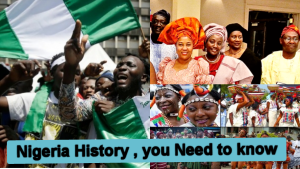
Nigeria, a vibrant country located in West Africa, has a history that stretches back thousands of years. From ancient civilizations to colonialism and independence, Nigeria’s story is a captivating journey through time. In this blog post, we will explore the key milestones and events that have shaped the history of Nigeria, showcasing its diverse culture, the struggle for independence, and the path toward nationhood.
Ancient Civilizations and Kingdoms:
Nigeria’s history is marked by the rise and fall of various ancient civilizations and kingdoms. Notably, the Nok civilization (500 BCE to 200 CE) in central Nigeria left behind exquisite terracotta sculptures, a testament to their advanced artistic and metallurgical skills. The Kingdom of Benin, with its magnificent bronze artworks, flourished from the 13th to the 19th century. The Hausa city-states, such as Kano and Zaria, thrived as centers of trade and Islamic scholarship.
The Arrival of Europeans and the Slave Trade:
The 15th century witnessed the arrival of European explorers, most notably the Portuguese, who established trade relations with coastal communities. Unfortunately, this also marked the beginning of the transatlantic slave trade, as Europeans exploited the region’s human resources. Millions of Africans, including Nigerians, were forcibly taken from their homeland and sold into slavery, leaving a lasting impact on Nigeria’s demographics and history.
British Colonialism and the Amalgamation:
By the late 19th century, Britain established its colonial presence in Nigeria. The country was divided into two protectorates, Northern Nigeria and Southern Nigeria, which were later merged in 1914, forming the entity known as Nigeria. British rule brought significant changes to Nigeria’s political, economic, and social landscape, including the introduction of modern infrastructure, educational institutions, and the spread of Christianity.
The Struggle for Independence:
In the mid-20th century, Nigeria began its quest for self-determination and independence. The Nigerian youth, intellectuals, and nationalist leaders played pivotal roles in advocating for freedom from colonial rule. Notable figures such as Nnamdi Azikiwe, Obafemi Awolowo, and Ahmadu Bello emerged as key voices in the fight for independence. After years of negotiations, Nigeria gained its independence on October 1, 1960, becoming a sovereign nation.
Challenges and Triumphs of Nationhood:
The post-independence era was marked by both challenges and triumphs. Nigeria faced numerous political, ethnic, and economic struggles, including military coups, civil war, and issues of governance. However, Nigeria’s rich cultural heritage and resilience helped forge a sense of unity among its diverse population. Notable milestones include the return to civilian rule in 1999 and Nigeria’s emergence as Africa’s largest economy.
Contemporary Nigeria:
Today, Nigeria stands as a vibrant nation, embracing its cultural diversity and striving for socioeconomic development. The country’s population continues to grow rapidly, and its arts, music, literature, and film industries have gained international recognition. Nigeria’s rich oil reserves, agriculture, and burgeoning technology sector contribute to its economic growth, while challenges such as corruption, inequality, and security concerns persist.
Discovery Of Nigeria Flag
The flag of Nigeria is a horizontal triband of green, white, and green. The two green stripes are positioned on the top and bottom, while the white stripe is in the middle. The flag’s proportions are in a ratio of 1:2, meaning that the width is double the height.
The green color represents Nigeria’s agricultural wealth, as the country is blessed with fertile land and abundant natural resources. It also symbolizes the nation’s lush vegetation and its commitment to agricultural development. Green is often associated with growth, hope, and vitality.
The white stripe in the middle represents peace, harmony, and unity among Nigeria’s diverse population. It signifies the country’s desire for tranquility and its pursuit of national cohesion despite its various ethnic, religious, and cultural differences. White is often associated with purity, honesty, and sincerity.
The flag of Nigeria was designed by a Nigerian student named Michael Taiwo Akinkunmi in 1959. It was officially adopted as the national flag on October 1, 1960, when Nigeria gained independence from British colonial rule.
The flag serves as a visual representation of Nigeria’s identity and aspirations as a nation. It embodies the values of agricultural prosperity, peace, and unity that the Nigerian people strive to achieve and uphold.
The flag of Nigeria is a proud symbol that is displayed during national celebrations, events, and official ceremonies. It is a reminder of the country’s history, progress, and the collective spirit of its people.
Nigeria’s three Major Tribes
Nigeria is a diverse country with over 250 ethnic groups, but there are three major tribes that stand out in terms of population and influence. These major tribes are:
Hausa-Fulani:
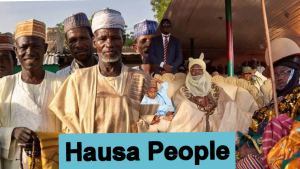
The Hausa-Fulani is the largest ethnic group in Nigeria, predominantly residing in the northern part of the country. The Hausa people have a rich history and are known for their trading skills and Islamic heritage. The Fulani, on the other hand, are primarily nomadic pastoralists who have played a significant role in shaping the economic and political landscape of the region. The Hausa-Fulani are known for their vibrant culture, traditional attire like the babban riga, and the Durbar festival, which showcases equestrian skills and colorful cultural displays.
Yoruba:
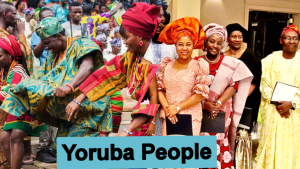
The Yoruba people are primarily concentrated in the southwestern part of Nigeria. They have a rich cultural heritage, dating back to ancient kingdoms like the Oyo and Ife. The Yoruba are known for their art, music, folklore, and strong emphasis on education. They have produced renowned artists, writers, and musicians who have contributed significantly to Nigeria’s cultural scene. Festivals such as the Osun-Osogbo festival, the Egungun masquerade, and the Ojude Oba celebration highlight the vibrancy of Yoruba traditions.
Igbo:
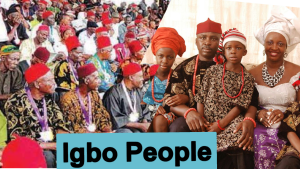
The Igbo people are one of the largest ethnic groups in Nigeria, primarily residing in the southeastern part of the country. They have a rich cultural heritage, with a history steeped in ancient civilizations like Nri and Igbo-Ukwu. The Igbo are known for their entrepreneurial spirit, intellectual prowess, and contributions to various sectors, including commerce, education, and the arts. Igbo cultural festivals like the New Yam Festival (Iri Ji), the Mmanwu masquerade, and the Ozo title-taking ceremony showcase their vibrant traditions and customs.
These three major tribes, the Hausa-Fulani, Yoruba, and Igbo, have played significant roles in Nigeria’s history, politics, economy, and cultural development. However, it’s important to note that Nigeria is a diverse country with numerous other ethnic groups, each contributing to the nation’s multicultural fabric and national identity.
Different Types of Nigerian Food

Nigerian cuisine is diverse and flavorful, reflecting the country’s rich cultural heritage and regional influences. Traditional Nigerian food combines various ingredients, spices, and cooking techniques to create delicious and satisfying dishes. Here are some popular Nigerian foods:
Jollof Rice:
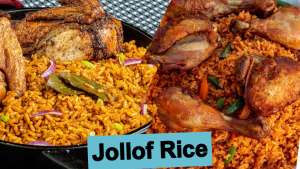
Jollof Rice is a staple dish in Nigeria and is widely enjoyed across West Africa. It is a one-pot rice dish cooked with tomatoes, peppers, onions, and a blend of spices. Often served with chicken, beef, or fish, Jollof Rice is known for its vibrant red color and delicious taste.
Egusi Soup:

Egusi Soup is a popular Nigerian soup made from ground melon seeds. It is cooked with a variety of vegetables, such as spinach, bitter leaf, or pumpkin leaves, and often includes meat or fish. Egusi Soup is usually enjoyed with pounded yam, eba (garri), or fufu, which are traditional Nigerian starchy accompaniments.
Suya:
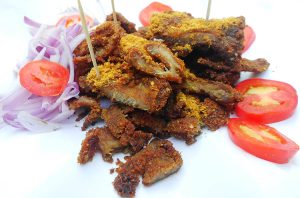
Suya is a well-known Nigerian street food. It consists of skewered and grilled meat, typically beef, chicken, or goat, that is seasoned with a spicy peanut-based marinade. Suya is often served with sliced onions, tomatoes, and a sprinkle of yaji spice for added flavor.
Pounded Yam and Egusi Soup:
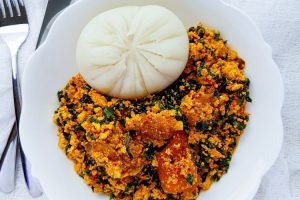
Pounded Yam is a popular Nigerian swallow (a thick starchy side dish). It is made by boiling yam and pounding it into a smooth, stretchy consistency. Pounded Yam is often paired with Egusi Soup, as mentioned earlier, or other traditional soups like Ogbono Soup or Okra Soup.
Akara:

Akara, also known as bean cakes or bean fritters, is a popular Nigerian street snack. It is made from ground black-eyed peas or beans mixed with onions, peppers, and spices. The mixture is deep-fried until golden brown, resulting in a crispy exterior and a soft, savory interior.
Moi Moi:

Moi Moi is a steamed bean pudding that is enjoyed as a side dish or a main meal. It is made from peeled beans that are blended with onions, peppers, and other seasonings. The mixture is then steamed in banana leaves or foil until it becomes a firm, custard-like consistency.
Chin Chin:

Chin Chin is a crunchy snack enjoyed in Nigeria. It is made from a mixture of flour, sugar, butter, and sometimes milk or eggs. The dough is cut into small pieces, deep-fried until golden brown, and then sweetened or spiced according to preference.
These are just a few examples of the diverse range of Nigerian dishes. Nigerian cuisine is full of flavors, spices, and textures that cater to various palates and preferences. Exploring the culinary delights of Nigeria is an adventure in itself, offering a taste of the country’s vibrant culture and gastronomic heritage.
Nigeria’s history is intricately woven with its tribal diversity and cultural heritage. The nation embraces a myriad of tribes, each contributing to Nigeria’s vibrant tapestry of languages, traditions, and festivals. The national flag serves as a symbol of Nigeria’s aspirations for agricultural prosperity, peace, unity, and purity. As Nigeria continues to evolve, it celebrates its diverse tribes, their unique cultures, and their collective contributions to the nation’s progress and identity.
In exploring Nigeria’s history, let us embrace and appreciate the cultural richness of its tribes, for they are the pillars upon which the nation stands, representing its resilience, unity, and shared destiny

Leave a Reply